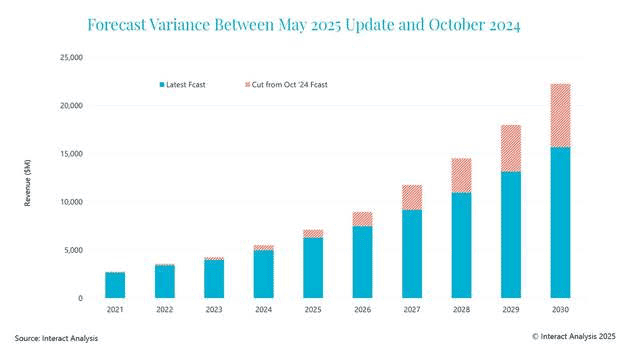|
Research firm Interact Analysis has significantly downgraded its forecast for Autonomous Mobile Robots (AMRs, citing a variety of factors.
Writing on the research firm’s blog post, Ash Sharma, Chief Commercial Officer & VP of Research - Robotics & Warehouse Automation for Interact says that “The mobile robot industry, previously marked by rapid expansion and investment, is now undergoing a period of challenges and readjustment.”
Interact reduced its AMR forecast for 2025 by $800 million, with lower growth predicted in each of the major regions.
Sharma says this adjustment reflects a broader reassessment of the industry’s growth trajectory, with the 2030 revenue projection now coming in at $15.6 billion, down from its earlier, more optimistic estimates.
The resulting compound annual growth rate (CAGR) for the next five years has also been trimmed from 26% down to 21% - still healthy growth, but slower than previously expected.
What is going on?
Not surprisingly, tariffs will play a key role Sharma says. The Trump tariffs “are reshaping global supply chains and injecting a high degree of uncertainty into capital investment decisions, causing delays. Companies are holding back on large-scale automation investments, wary of shifting trade policies and uncertainty over both their own costs and the fiscal health of customers and vendors.”
As a result, many companies are adopting a “wait-and-see” approach, delaying strategic investments in warehouse automation and infrastructure, Sharma says.

The tariffs of course are also pushing AMR costs higher, with even US-made AMRs using a significant amount of foreign-made components subject to the tariff hits.
Another factor in the AMR forecast downgrade: sluggish growth in new distribution center construction, which often fuels investments in automation.
(See More Below)
|
CATEGORY SPONSOR: SOFTEON |
|
|
| |
| |
|
|
“The global forecast for new warehouse capacity in 2025 has been revised upward slightly, but still remains in negative territory at -2.0% year-over-year out to 2030. Elevated construction costs, industrial overcapacity, and policy uncertainty continue to weigh heavily on the sector,” Sharma writes.
Interact also says that changes in its methodology also impacted its AMR forecast downgrade.
“The message from Interact Analysis is clear: the mobile robot industry is still growing, but not as fast or as smoothly as once expected,” Sharma concludes, adding that “Tariffs, economic uncertainty, and shifting global dynamics are forcing companies to rethink their strategies and timelines.”
He adds that for AMR vendors, “The fundamentals of automation remain strong, but the path forward will require some careful navigation.”
Any reaction to the this article on AMRs? Let us know your thoughts at the Feedback section below.
|